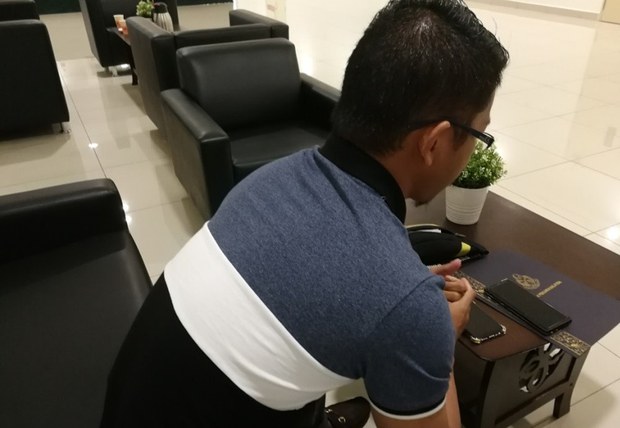Malaysia: Ex-IS Cell Leader Says Rehabilitation Changed his Life
2019.10.01
Kuala Lumpur
 A Malaysian man recounts his involvement with the Islamic State militant group during an interview at Kajang Prison in Selangor, Malaysia. Oct. 1, 2019.
A Malaysian man recounts his involvement with the Islamic State militant group during an interview at Kajang Prison in Selangor, Malaysia. Oct. 1, 2019.
A 36-year-old Malaysian man said he was ready to die for the Islamic State militant organization – but that was before his February 2016 arrest and subsequent rehabilitation.
The man told reporters Tuesday that he ran 13 chat groups on WhatsApp and Telegram and had recruited 50 to become members of the Islamic State (IS) extremist group. Malaysian corrections officials denied journalists who interviewed the man permission to use his real name because of his former ties to IS.
“Yes, I would [die for IS] but, thank God, that I did not get to that stage,” he said.
The man was part of a group of IS members in Malaysia who were convicted and sentenced in April 2016 to two years in prison and rehabilitation program under the Prevention of Terrorism Act 2002 for involvement in IS activities. His charges were tied to recruiting and spreading propaganda as well as helping others collect funds to help those who wanted to travel to Syria and Iraq to join IS fighters.
“To me, the rehabilitation program worked. Who thought they would be able to change my ideology, but they did eventually,” the former IS member told reporters after launching a three-day workshop at Kajang Prison in Selangor state on preventing and countering violent extremism.
“If you asked me when I was first arrested and put in jail, I would diss the facilitators and the people who worked in the rehabilitation program for their inability to counter my argument,” he said.
“But sessions with religious figures, preachers they brought in sometimes weekly, biweekly or monthly depending on the availability of the individuals, helped me to understand religion better.”
The man said he became involved with IS at a time when he wanted to learn more about Islam.
“There was no problem back home, my life was fine. But at the time, I was looking for the true Islamic teaching and every day I saw videos of the injustice done against fellow Muslims abroad on Facebook and reading the materials that made me angry,” he said.
“I could not just stand and talk about the injustice. I felt that it was my responsibility to help my Muslim brothers and sisters,” he said.
The workshop included officers from religious departments, the Southeast Asia Regional Center for Counter Terrorism (SEARCCT), the Royal Malaysia Police, the Attorney General’s Chamber and the Malaysia Prisons Department.
The man said he became an IS cell leader and established the Al Qubro Generation, a Telegram group tasked with recruiting IS members and collecting funds to help those who wanted to travel to Syria. The group collected 15,000 ringgit (U.S. $3,577) in three months.
“After I created my own group, I let go of the others and put all my focus into one. I named the group Al Qubro Generation to take on the name of Al-Malhama Al-Kubra, the great battle prophesied to occur at the end of time between Muslims and unbelievers. And the generation for those in the group who were ready to fight in the war,” he said.
Since his release from prison in April 2018, the former IS recruiter has been assisting Malaysian corrections officials and other authorities to spread awareness through forums and interviews.
“This is more of me redeeming myself by sharing what happened to me and what I had done wrong in the past, so that the others would not be easily influenced by IS propaganda,” he said.
Rehabilitation starts day one
The rehabilitation and reintegration into society of radical inmates starts on the day they report to prison and continues until they leave, said Zulkifli Omar, director general of the Prisons Department.
“All prisoners must follow the human development program handled by well-trained prison officers,” Zulkifli said.
Malaysia has 116 radical detainees along with 2,000 listed as high-risk detainees among 72,000 prisoners serving their sentences at the 53 prisons nationwide, according to Malaysian prison statistics released Tuesday.
Zainal Abidin Abu Hassan, deputy secretary-general at the Ministry of Home Affairs, said the workshop was part of its effort to develop a National Plan of Action for Preventing Violent Extremism.
“This program involves many parties and this showed that collaboration and cooperation is important in controlling, managing and rehabilitating, especially in terms of deradicalization and establishing a counter narrative related to extremism and radicalism,” he said.







